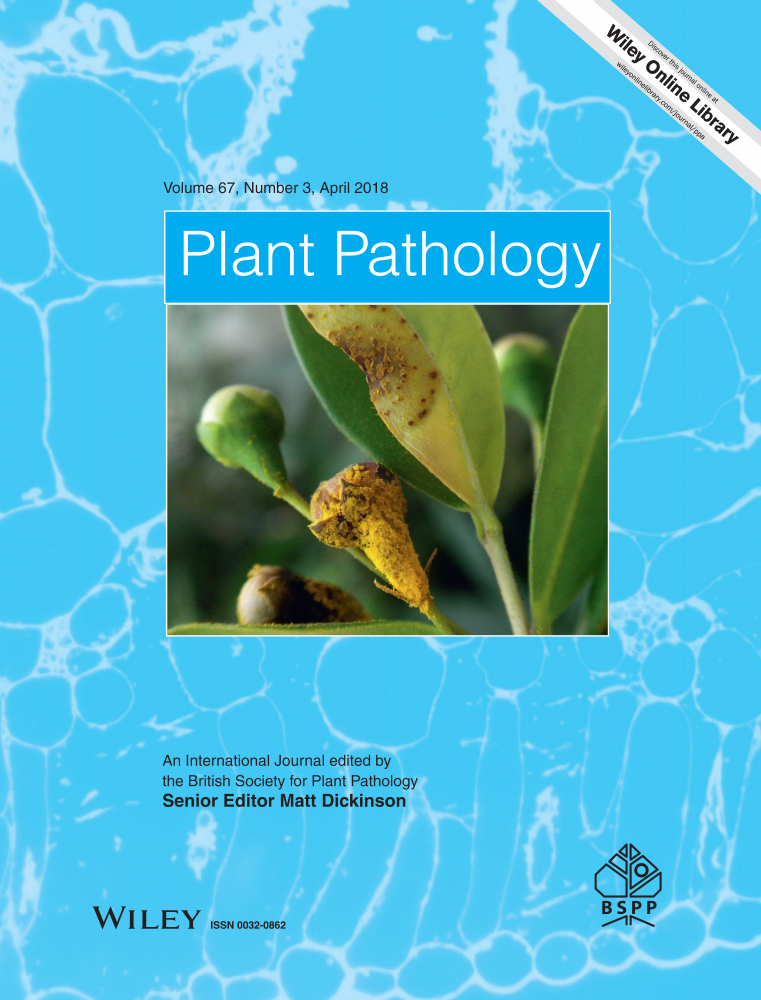Ms Ginna M. Granados

| PhD student | |
Department |
|
Biochemistry, Genetics and Microbiology |
|
| This email address is being protected from spambots. You need JavaScript enabled to view it. |
Research Profiles
- Google Scholar
 orcid.org/0000-0003-2749-8032" target="_blank">ORCID
orcid.org/0000-0003-2749-8032" target="_blank">ORCID
My Supervisor/s
| Primary Supervisor | |
| Irene Barnes | |
Co Supervisor |
|
| Michael J. Wingfield | |
| Carlos A. Rodas |
My name is Ginna Granados. I obtained my BSc (Hons) degrees in Industrial Microbiology and Agricultural and Veterinary Microbiology, both in Pontificia Universidad Javeriana from Bogotá, Colombia (South America). My interest for research, Entomology and Plant Pathology began during my studies and they kept increasing over time.
Before I joined FABI, I was working with Dr. Carlos Rodas in the Forest Health Protection Program of SmurfitKappa, which encourage me to continue my studies as a MSc student. In my MSc, my research was focused on the Myrtle rust, Austropuccinia psidii. Thus, three stem canker pathogens belonging to the Cryphonectriaceae isolated as endophytes.
For my PhD, I will be focusing on the population genetics and genomics of pine needle pathogens of importance for Colombia and South Africa forestry industry. The main pathogen that I will be working on is Dothistroma septosporum, one of the causal agents of DNB (Dothistroma Needle Blight disease). My research findings will give a clear perspective on the genotypic diversity, if there is a dominant or multiple haplotypes responsible for the disease in the country, and some other key aspects to understand its life cycle in a tropical environment.
This is an exciting collaboration project between Colombia and South Africa.
My Book Chapters
| Book Chapters |
|---|
| Barnes I, van der Nest A, Granados GM, Wingfield MJ. 2022. Dothistroma needle blight. In: Forest Microbiology. Asiegbu F, Kovalchuk A. (eds). Elsevier, pp 179 - 199. |
My Journal Articles
| Publication |
|---|
| Granados GM, Rodas CA, Vivas M, Wingfield MJ, Barnes I. (2023) Patterns of Dothistroma septosporum conidial dispersal in Colombian Pinus tecunumanii plantations. Forest Pathology (00):e12834.
10.1111/efp.12834 |
| Paap T, Santini A, Rodas CA, Granados GM, Pecori F, Wingfield MJ. (2023) Myrtus communis in Europe threatened by the pandemic and South African strains of the myrtle rust pathogen Austropuccinia psidii (Sphaerophragmiaceae, Pucciniales). NeoBiota 84:41-46.
10.3897/neobiota.84.95823 |
| Soewarto J, Somchit C, du Plessis E, Barnes I, Granados GM, Wingfield MJ, Shuey L, Bartlett M, Fraser S, Scott P, Miller E, Waipara N, Sutherland R, Ganley B. (2021) Susceptibility of native New Zealand Myrtaceae to the South African strain of Austropuccinia psidii: A biosecurity threat. Plant Pathology 70:667-675.
10.1111/ppa.13321 |
| McTaggart AR, du Plessis E, Roux J, Barnes I, Fraser S, Granados GM, Ho WWH, Shuey LS, Drenth A. (2020) Sexual reproduction in populations of Austropuccinia psidii. European Journal of Plant Pathology 156:537-545.
10.1007/s10658-019-01903-y |
| Granados GM, McTaggart AR, Rodas CA, Roux J, Wingfield MJ. (2019) Species of Cryphonectriaceae occupy an endophytic niche in the Melastomataceae and are putative latent pathogens of Eucalyptus. European Journal of Plant Pathology
10.1007/s10658-019-01887-9 |
| du Plessis E, Granados GM, Barnes I, Ho WH, Alexander BJR, Roux J, McTaggart AR. (2019) The pandemic strain of Austropuccinia psidii causes myrtle rust in New Zealand and Singapore. Australasian Plant Pathology 48:253-256.
10.1007/s13313-019-0624-x |
 McTaggart AR, Shuey LS, Granados GM, du Plessis E, Fraser S, Barnes I, Naidoo S, Wingfield MJ, Roux J. (2018) Evidence that Austropuccinia psidii may complete its sexual life cycle on Myrtaceae. Plant Pathology 67:729-734.
10.1111/ppa.12763 McTaggart AR, Shuey LS, Granados GM, du Plessis E, Fraser S, Barnes I, Naidoo S, Wingfield MJ, Roux J. (2018) Evidence that Austropuccinia psidii may complete its sexual life cycle on Myrtaceae. Plant Pathology 67:729-734.
10.1111/ppa.12763 |
| Rodas CA, Hurley BP, Bolaños MD, Granados GM, Wingfield MJ. (2018) Biology of Litosermyle ocanae in Colombian Pinus patula plantations. Southern Forests
10.2989/20702620.2017.1334175 |
| du Plessis E, McTaggart AR, Granados GM, Wingfield MJ, Roux J, Pegg GS, Makinson J, Purcell M, Ali M. (2017) First report of myrtle rust caused by Austropuccinia psidi on Rhodomyrtus tomentosa (Myrtaceae) from Singapore. Plant Disease 101(9):1676.
10.1094/PDIS-04-17-0530-PDN |
| Granados GM, McTaggart AR, Barnes I, Rodas CA, Roux J, Wingfield MJ. (2017) The pandemic biotype of Austropuccinia psidii discovered in South America. Australasian Plant Pathology 46(3):267-275.
10.1007/s13313-017-0488-x |
| Rodas C.A, Hurley B.P., Bolanos M.D, Granados G.M, Wingfield M.J. (2017) Biology of Litosermyle ocanae in Colombian Pinus patula plantations. Southern Forests :1-6.
10.2989/20702620.2017.1334175 |
| Roux J, Granados GM, Shuey L, Barnes I, Wingfield MJ, McTaggart AR. (2016) A unique genotype of the rust pathogen, Puccinia psidii, on Myrtaceae in South Africa. Australasian Plant Pathology 45:645-652.
10.1007/s13313-016-0447-y |
| McTaggart AR, Roux J, Granados GM, Gafur A, Tarrigan M, Santhakumar P, Wingfield MJ. (2016) Rust (Puccinia psidii) recorded in Indonesia poses a threat to forests and forestry in South-East Asia. Australasian Plant Pathology 45(1):83-89.
10.1007/s13313-015-0386-z |
| Rodas CA, Wingfield MJ, Granados GM, Barnes I. (2016) Dothistroma Needle Blight: an emerging epidemic caused by Dothistroma septosporum in Colombia. Plant Pathology 65(1):53-63.
10.1111/ppa.12389 |
| Rodas CA, Roux J, Maier W, Granados GM, Bolaños MD, McTaggart AR, Wingfield MJ. (2015) First report of Puccinia psidii on Corymbia citriodora and Eucalyptus in Colombia. Forest Pathology 45(6):534–536.
10.1111/efp.12223 |
| Rodas C.A, Roux J., Maier W., Granados G.M, Bolanos M.D, McTaggar A.R., Wingfield M.J. (2015) First report of Puccinia psidii on Corymbia citriodora and Eucalyptus in Colombia. Forest Pathology :1-3.
10.1111/efp.12223 |
| Rodas CA, Serna R, Bolaños MD, Granados GM, Wingfield MJ, Hurley BP. (2015) Biology, incidence and host susceptibility of Pineus boerneri (Hemiptera: Adelgidae) in Colombian pine plantations. Southern Forests 77:165-171.
10.2989/20702620.2014.1001662 |
| Rodas CA, Serna R, Hurley BP, Bolaños MD, Granados GM, Wingfield MJ. (2014) Three new and important insect pests recorded for the first time in Colombian plantations. Southern Forests: a Journal of Forest Science 76(4):245-252.
10.2989/20702620.2014.965983 |

